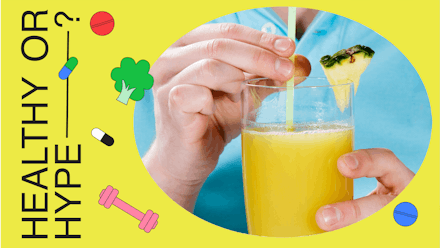Why TikTokers are chugging pineapple juice before wisdom tooth surgery

If your TikTok algorithm tends to lead you down rabbit holes of supposed health hacks, you’ve likely run into at least one viral video of a teenager drinking half a gallon of pineapple juice before getting their wisdom teeth removed. Many claimed that binge-drinking pineapple juice a day before the big surgery prevented their faces from swelling into a painful flesh balloon.
Although this health fad has been making rounds on more current corners of the net, it’s nothing new. For years, parenting blogs have sworn by the magical healing powers of pineapple juice. As someone who avoids pain at all costs and has been putting off getting their wisdom tooth removed for way (and I mean, way) too long, I was instantly intrigued. Does drinking pineapple juice actually prevent swelling, even after such an intensive procedure? And would I really need to drink the entire 64 ounces for it to work?
The roots of this health claim rely on an enzyme called bromelain, which can only be found in pineapple. Although the results of clinical studies have been mixed, it is widely believed that certain properties of bromelain reduce pain and promote healing after surgeries. In fact, pineapple has been used to treat indigestion and inflammation in South and Central American indigenous cultures for centuries, according to Mount Sinai.
After some research and talking to several health experts, I came to a conclusion: While drinking 64 ounces of pineapple juice would probably help reduce swelling after wisdom tooth surgery, it’s not the most practical or healthiest method to do so.
Still, some experts seem pretty enthusiastic about the multifaceted health benefits of consuming (fresh, not canned) pineapple juice. “Pineapples are full of nutrients and vitamins [and they are] a substantial source of vitamin C, a potential collagen formation,” William Kemper, a pediatric dentist in Louisville, Kentucky, told me. “So that is why a chilled glass of pineapple juice before or after — preferably before — is a great way to help your body heal after the surgery.” Kemper compares having a cold glass of pineapple juice to other methods that reduce swelling, such as eating ice cream or drinking any cold drink, but with the added benefits of pineapple’s natural properties. However, note that he mentions drinking one glass, not an entire half-gallon of it.
In fact, most of the doctors I spoke with agreed that bromelain likely helped reduce inflammation and mitigate post-surgery pain. At the same time, almost all were skeptical about the methods being promoted on social media. That’s to be expected, though: How could anything outside of strong, FDA-approved drugs really mediate the exceptional pain that comes with getting a tooth yanked out?
Joyce Kahng, a cosmetic dentist and owner of Orange + Magnolia Dental Studio, hopped on the pineapple juice discourse earlier this summer and made a TikTok to confirm that bromelain did, in fact, have anti-inflammatory properties. But when I reached out to her, Kahng made it clear that if she were to have wisdom teeth surgery tomorrow, she probably wouldn’t drink 64 ounces’ worth of it. “Pineapple juice can be very acidic and cause erosion of the enamel,” she tells me. “For those who choose to drink it, I would recommend not sipping it throughout the day but rather keep the drinking within a time frame so the oral environment can neutralize.”
In other words, you shouldn’t just chug pineapple juice leading up to the surgery, as various TikTokers have. A more sound method is to just drink a little bit of it beforehand. Some experts reminded me that even though pineapple juice contains bromelain, we can’t forget that it still has a pH of around 3, which is highly acidic. Ingesting too many acidic foods can have been linked to to liver problems, bone damage and (sigh) yes, cancer.
Although there are studies here and there that show promising signs of the healing properties of bromelain, they don’t necessarily prove that the enzyme by itself leads to faster healing. “These studies are based on small sample sizes and were not conclusive,” says Neil J. Gajjar, a dental surgeon in Mississauga, Canada. He also criticized the social media recommendation of drinking 64 ounces. “This is a lot of juice and the sugar and acid with that much consumption is not good for you or your teeth.” It’s true.
One 46-ounce can of Dole pineapple juice, for example, contains 30 grams of sugar, which is about six more grams than the recommended daily sugar intake. For the sake of simplicity (and to do as little math as possible), let's just say that drinking a can-and-a-half would put you way over that recommended limit. Gajjar went on to explain that there are several pain-relieving medications that people can take before and after their surgeries, and that people should listen to their doctors and not TikTokers.
In Europe, however, there is a drug called Ananase, which contains bromelain in a concentrated pill form, according to Gian Pietrol Schincaglia of Case Western Reserve University. Schincaglia cited a 2014 study that found that bromelain was just as effective in preventing swelling as Nonsteroidal, an anti-inflammatory drug.
A more chill alternative to chugging would be to invest in bromelain pills or, as mentioned earlier, have just a couple of cold glasses of pineapple juice before surgery. To be honest, learning about the fruit’s properties and its wide use in pre-colonial cultures made the entire juice ordeal all the more intriguing. I think I’ll definitely drink a glass before my long-overdue appointment, if that date ever comes.